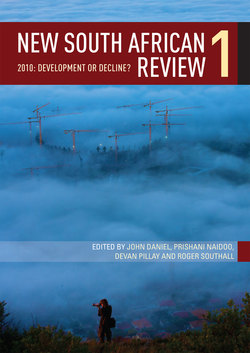Читать книгу New South African Review 1 - Anthony Butler - Страница 13
На сайте Литреса книга снята с продажи.
Division within the ANC
ОглавлениеButler outlines how the divisions within the ANC which erupted in the ousting of Mbeki as ANC president and the election of Zuma at Polokwane in December 2007 have continued into the Zuma government. Unlike under Mbeki, differences within the party are increasingly open, yet contestation is often ill-mannered, supposed debate about policies is often really about personal and factional advantage, and the party is increasingly riven by struggles for office, patronage and resources, with Zuma balancing one faction off against another while, simultaneously, Xhosas are replaced by Zulus in key locations, notably the intelligence services. So desperate is this struggle that in some provinces and municipalities it is waged with violence, killings and assassination. Reference has already been made to how ANC politics have penetrated the parastatals, but factional struggle has also entered the public service, and various ministries have become host to political networks which seek diversion of public resources to private pockets. As Hoag demonstrates below with regard to a single department, Home Affairs, this administrative disorder results in enervation, fear, corruption and ‘comfortable underperformance’. This endangers projects of institutional reform, and under Zuma, is widely perceived to have rendered the government rudderless. Meanwhile, although labels of right and left are of dubious utility (Julius Malema of the ANC Youth League punts nationalisation of the mines while the South African Communist Party rejects it), Zuma’s opting for broad continuity in fiscal policy under the finance minister, Pravin Gordhan, has alienated Cosatu and the SACP and placed major strain on the coalition of support which brought him to power. Indeed, partly resulting from his own personal indiscretions which have caused the party acute embarrassment, but more particularly because he appears to be distancing himself from the organised left, Zuma’s own position has now become a matter of debate, and the party may well be plunged into a succession struggle well before he is required to seek re-election as leader at the party’s next scheduled national conference in 2012.
Zuma’s ascendancy to the presidency has been widely interpreted as having presented a threat to constitutionalism. The decision by the National Prosecuting Authority (NPA) to drop the corruption charges against Zuma before the 2009 election; the abolition of the Scorpions, the prosecuting authority within the NPA which was pressing charges against him; the appointment of an apparent Zuma loyalist as national prosecutor; and a series of judicial appointments which have been much criticised within the legal fraternity have all been widely represented as a threat to judicial independence and the separation of powers which is formally embedded in the constitution. More widely, the penetration of ANC political battles into the public service presents a major long term-threat to capacity as well as to the rule of law.
